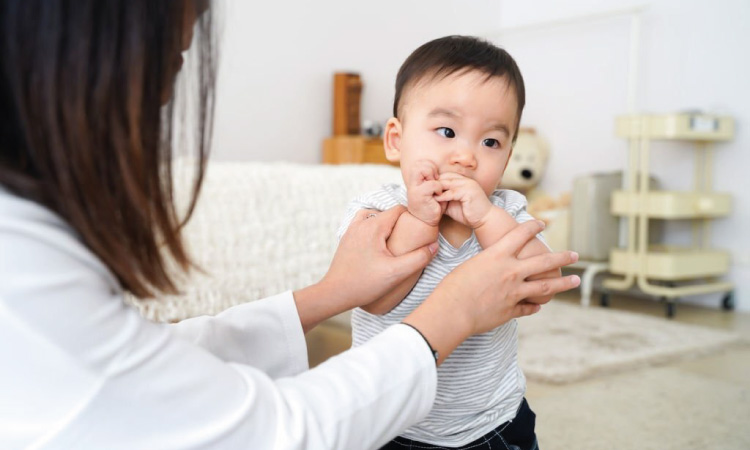Biting their nails is quite common among toddlers. Nail-biting in toddlers has a variety of causes, including being curious, being bored, or being stressed. It may also be a way for them to pass the time. The act of nail-biting falls into the category of “nervous habits,” which also include tooth grinding, nose picking, hair twisting or pulling, and thumb sucking. If this habit is not broken quickly, it can lead to permanent nail damage. In this article, let us discuss how to get your toddler to stop biting nails.
Why Do Toddlers Bite Their Nails?
Nail-biting involves biting the cuticle and soft tissues around the nail, as well as the nail itself. For a variety of reasons, toddlers might bite their nails. The reasons can range from boredom to deeper problems that need to be addressed. Sometimes, toddlers bite their nails to imitate their parents or other caregivers. As long as your child does not injure himself and the nail-biting never becomes excessive, there is no cause for concern. Similarly, casual nail-biting (for instance, doing it in moments of anguish, when they listen to sad or horror stories, watch television, etc.) is also of no concern.
However, 2-year-old biting nails until they bleed should be addressed. Similarly, consult a physician if your child’s habit of biting his or her nails suddenly emerges and intensifies. Both can be due to a serious underlying issue. Never nag, though. It is more likely that they will continue to bite nails if you nag, punish, or remove their fingers from the mouth.
Causes Of Nail-Biting In Toddlers
Nail-biting is a habit. Habits are repetitive behaviors that are ingrained in us from childhood. Some habits are considered good because they are beneficial for a person’s physical and mental health, whereas others are considered bad because of their negative effects. One such habit is nail-biting, also known as onychophagia.
Related Reading: Is Your Toddler Hitting Himself? Then Here’s What You Need To Know
Many toddlers who bite their nails aren’t doing it because they have a specific problem, but rather because they do it on occasion for no apparent reason.
Listed below are a few of the most common causes of toddler nail-biting:
1. Anxiety and fear
Onychophagia, also known as nail-biting, is considered a common oral stress-relieving behavior1. Anxious toddlers bite their nails because it helps them get their minds off of the problem at hand, making them feel a little less stressed. When frightened or anxious, a toddler may bite their nails.
2. Runs in family
Children whose parents have a habit of biting their fingernails are more likely to do the same thing themselves, although researchers are unsure as to whether or not this behavior is passed down through generations. How genes affect behaviors like nail-biting is unknown. Yet, babies who come from families where nail-biting runs in the family are more likely to develop the habit themselves.
Even if parents stop before childbirth, toddlers may pick up the habit. According to one study, 36.8% of nail biters have at least one family member who does the same. Further, identical twins are more likely than non-identical twins to be nail-biters.
3. Psychiatric/mental disorders
Nail-biting in toddlers may be a symptom of behavioral issues. Examples are ADHD, separation anxiety disorder (SAD), obsessive-compulsive disorder (OCD), oppositional defiant disorder (ODD), and Tourette syndrome2. Chronic nail-biting can be an indication of a behavioral condition called body-focused repetitive behavior3.
4. Learned or picked up the behavior
According to some studies, nail-biting is a habit that can be acquired over time and does not necessarily reflect an underlying emotional disturbance. If a toddler sees a parent, primary caregiver, or older sibling biting their nails frequently, the toddler may try to imitate the behavior by biting their own nails.
5. Just because they are bored
Nail-biting in toddlers can be a symptom of boredom, rather than a sign of anxiety4. It is perfectly normal for some toddlers to bite their fingernails when they are bored and have nothing else to do.
Is It Normal For A 2 -3 Year Old To Bite Their Nails?

A child’s habit of biting their nails, sucking their thumbs, licking their lips, or even twirling their hair is quite common. While some children do it because they are anxious. Others do it because they are restless and unable to sit still. Children often use the act of biting their fingernails as a means of self-soothing.
Nail-biting is fairly common in toddlers. Around 40 % of children are found to contract it at some point5. Nail-biting typically begins after the fourth year of life, but it is not totally unheard of for a 2-year-old to do it. Even though nail-biting can be an indicator of more serious health issues, it’s generally considered harmless. Nail-biting is a habit that most children give up as they get older.
Related Reading: How To Stop Child From Biting Lower Lip? (1-3 Years)
How Can I Stop My Toddler From Biting His Nails?
There’s no surefire way to stop a toddler from biting their nails, but some of the following strategies and treatments may help. One thing you should avoid doing is punishing them for biting their nails. Likewise, try to discover the root of your child’s nail-biting problem before attempting any treatment.
For now, here are a few things to try while you’re trying to figure out what’s causing their nail-biting:
1. Trim and file your toddler’s nails.
This is the simplest way to stop your child from biting his or her nails. Make sure you always have a pair of nail clippers or a small nail file within easy reach. The nails should be trimmed to a length that makes them difficult to bite. It is also important to take care of the cuticles. When they are bored, toddlers will seek out other activities other than biting their nails if there is no nail for them to chew on.
2. Address their worries
It is imperative that you investigate the potential reasons behind your child’s nail-biting if you notice that they do it excessively. Your child’s nail-biting could be a symptom of anxiety or depression. Yes, even a toddler is capable of having anxious thoughts and feelings. Find out if there is any source of stress in your child’s life and work to alleviate it if you can. You should encourage your child to talk about the things that are worrying them, and you should be patient enough to listen to what they have to say.
3. Make the toddler more aware of their behavior
Whenever you see your toddler biting their nails, use cryptic sentences to draw their attention to the action they are taking. You could also alert the toddler by using a code or action that is only known to you, such as clapping, whistling, or making some other noise. If the toddler has a habit of daydreaming and biting their nails, this code of action will help them become aware of their behavior. The toddler will eventually develop less of a habit of biting their nails as a result of this. Do not, under any circumstances, yell at them or use foul language to alert them, as this will only exacerbate their fear.
Related Reading: The 10 Worst Things You Can Say To Your Child
4. Offer substitutes
When a toddler is tempted to bite their nails, encourage them to engage in other sensory activities instead of allowing themselves to succumb to temptation. For example, you may give them a variety of toys with varied textures, like modelling clay. These items may be able to keep the toddler from biting his nails if they provide enough sensory stimulation.
5. Praise positive behavior
Recognize and praise a toddler who has stopped biting his or her nails on their own accord. When it comes to instilling good habits in children, positive reinforcement works wonders.
6. Consider nail-biting deterrent nail polish
Nail polishes that have an unpleasant flavor and are non-toxic can help keep toddlers from biting their nails. First and foremost, it is imperative to consult a medical professional prior to putting any nail polish on your child because not all nail-biting polish for 2-year-old is safe. However, this should only be used as a last option. It’s possible to create the impression that your child is being punished by using tricks like bitter-tasting nail polish. It’s also possible that your child needs to put their hand in their mouth for other reasons, like eating finger foods. Because their nails taste bitter, they might not want to eat some of their favorite foods.
Alternatively, you can try some natural nail-biting remedies for toddlers. The following can be applied to your toddler’s fingernails:
- Aloe vera gel
- Bitter melon juice
- Garlic juice
7. Cover the nails
Covering toddlers’ nails with a barrier like gloves, mittens, socks, etc. will help to break the Nail-biting habit. The main aim is that you create a barrier to protect your nails from your teeth. You can also make the toddler wear adhesive bandages and/or colorful stickers on or over their nails. This makes the nails less accessible and provides a reminder not to do it in the first place.
8. Be patient with your child
When trying to break a bad habit, you may experience periods where things appear to be getting better, only for them to quickly deteriorate again. To help your child through this process, you must be patient with them. Habits usually fade away over time.
Complications Related To Child Nail-Biting

Watching your toddler gnaw on their fingernails is disgusting. However, it is not always perilous. Nevertheless, there are some complications associated with nail-biting in toddlers.
- Nail-biting damages not only the nail but also the cuticle and skin around the nail
- Any biting or picking below the cuticle can change the way the nail grows out
- Nail-biting can cause paronychia, a bacterial infection requiring antibiotics
- Biting nails increases the risk of warts around the fingernails in toddlers. These warts are caused by HPV, which enters the body through nail-biting cuts
- When toddlers put their fingers in their mouths after touching everything, they can get sick from ingesting germs. Nail-biting toddlers are prone to colds and flu
- Nail-biting in a toddler can cause dental issues
- Nail-biting can cause painful ingrown nails
Related Reading: 9 Indian Food For Toddlers During Cold And Cough
When To Worry About Nail-Biting In Toddlers?
Most toddlers have a temporary tendency to bite their nails. It does not warrant concern. However, you shouldn’t hesitate to talk to a pediatrician if any of the following apply to your toddler:
- It’s reached the point of being a chronic problem
- Bleeding nail beds or fingers
- Bacteria or fungi infections in nails due to biting
- Nail beds have been exposed as a result of frequent nail-biting
- Thickening nail skin or abnormal nail growth
- Nail-biting that results in ingrown nails
- In addition to nail-biting, toddlers exhibit other behaviors, such as skin picking, hair plucking, and excessive sweating
Treatment For Nail-Biting In Toddlers
Nail-biting does not have a specific treatment. Toddler mail-biting can be traced back to a variety of factors, including behavioral issues, which a doctor can investigate. For those toddlers who need more assistance, medical professionals and mental health professionals can provide specialized care. In addition to treating the cause, some toddlers with severe nail-biting may undergo CBT (cognitive behavioral therapy) and child-friendly relaxation techniques. Counseling or medication for the underlying condition usually stops nail-biting.
Conclusion

Most parents worry about their toddlers nail-biting. Your toddler may outgrow nail-biting as they get older, so don’t worry. If home remedies fail, never hesitate to see a pediatrician. Avoid harshly disciplining or scolding the child for biting their nails. You can’t get your child to stop biting their nails by lecturing, screaming, or punishing them nonstop.

